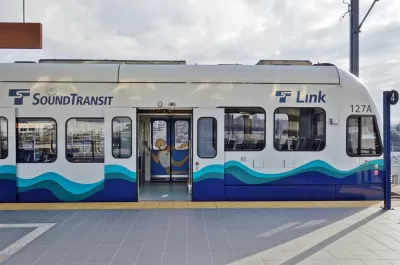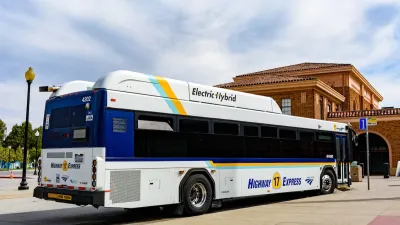Traditional strategies seek to attract major employers but often neglect the transportation networks that make commuting possible and convenient for more workers.

Despite evidence that "any employer, big or small, stands to benefit from an improved transportation network that shortens commutes," transportation and access have remained low priorities in economic development strategies, writes David Zipper in Bloomberg CityLab. Rather than focusing on creating effective transit networks that benefit all users, "business attraction remains a linchpin of local economic development, a field whose emphasis on tax breaks, real estate development and job training can seem frozen in time."
But "[b]y encouraging businesses to concentrate in convenient locations — and by demanding that infrastructure investments reduce commute times — economic developers can position their regions for productivity gains that will lift employers and workers alike." The period of readjustment after the pandemic, argues Zipper, "is an ideal time to shake things up. The pandemic-triggered rise of teleworking is making companies reassess location decisions, which will force economic developers to update their toolkits. That creates a golden opportunity to modernize their field by finally embracing the crucial role that transportation plays in fostering economic growth."
"Evaluated through this lens, projects like a new bus rapid transit line or an office complex placed atop a rail station will be economic development catalysts if they can reduce the region’s commute burdens. Conversely, a business park or residential community situated on the urban periphery, far from transit and major highways, will lengthen average commutes and take a toll on employers’ competitiveness." Yet, because of the long-term nature of transit projects and the short-term nature of political terms, these "[m]isaligned incentives present an obstacle to elevating the role of transportation in local economic development." For now, "we continue to see high-profile and expensive corporate recruitment campaigns" that ignore the high cost of worker commutes.
FULL STORY: It's Time for Economic Developers to Focus on Transportation

Alabama: Trump Terminates Settlements for Black Communities Harmed By Raw Sewage
Trump deemed the landmark civil rights agreement “illegal DEI and environmental justice policy.”

Planetizen Federal Action Tracker
A weekly monitor of how Trump’s orders and actions are impacting planners and planning in America.

The 120 Year Old Tiny Home Villages That Sheltered San Francisco’s Earthquake Refugees
More than a century ago, San Francisco mobilized to house thousands of residents displaced by the 1906 earthquake. Could their strategy offer a model for the present?

Ken Jennings Launches Transit Web Series
The Jeopardy champ wants you to ride public transit.

BLM To Rescind Public Lands Rule
The change will downgrade conservation, once again putting federal land at risk for mining and other extractive uses.

Indy Neighborhood Group Builds Temporary Multi-Use Path
Community members, aided in part by funding from the city, repurposed a vehicle lane to create a protected bike and pedestrian path for the summer season.
Urban Design for Planners 1: Software Tools
This six-course series explores essential urban design concepts using open source software and equips planners with the tools they need to participate fully in the urban design process.
Planning for Universal Design
Learn the tools for implementing Universal Design in planning regulations.
Clanton & Associates, Inc.
Jessamine County Fiscal Court
Institute for Housing and Urban Development Studies (IHS)
City of Grandview
Harvard GSD Executive Education
Toledo-Lucas County Plan Commissions
Salt Lake City
NYU Wagner Graduate School of Public Service





























